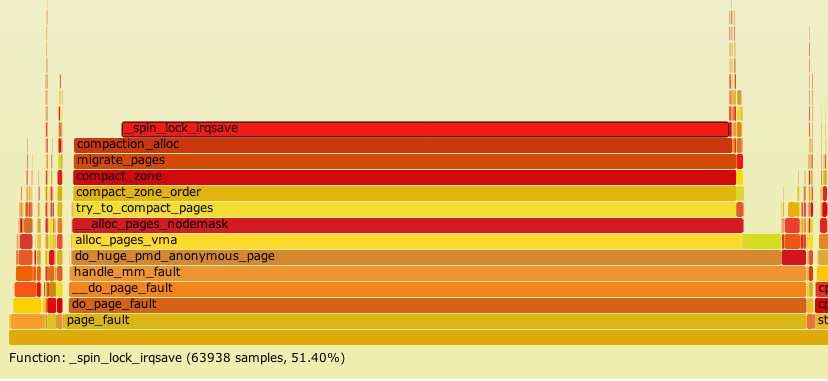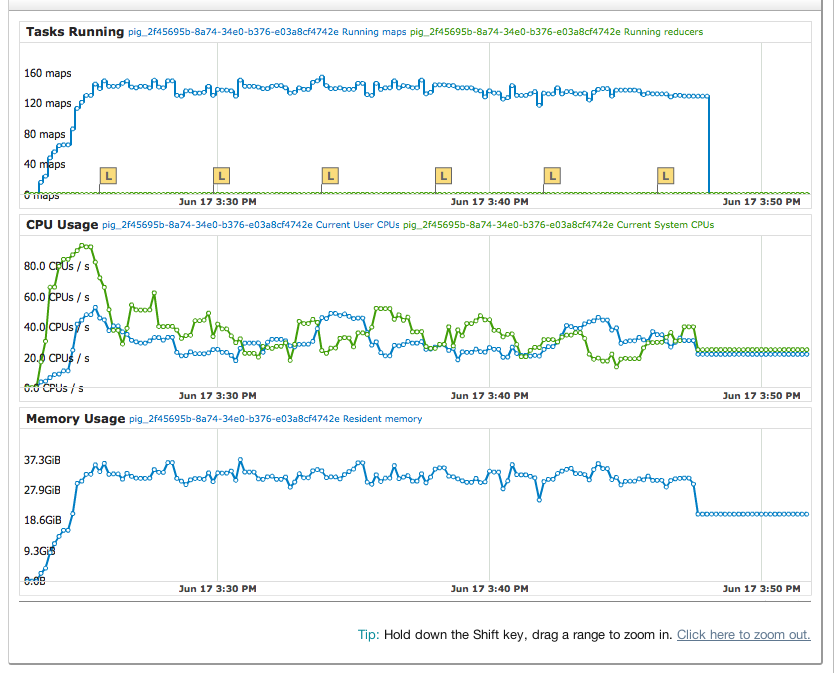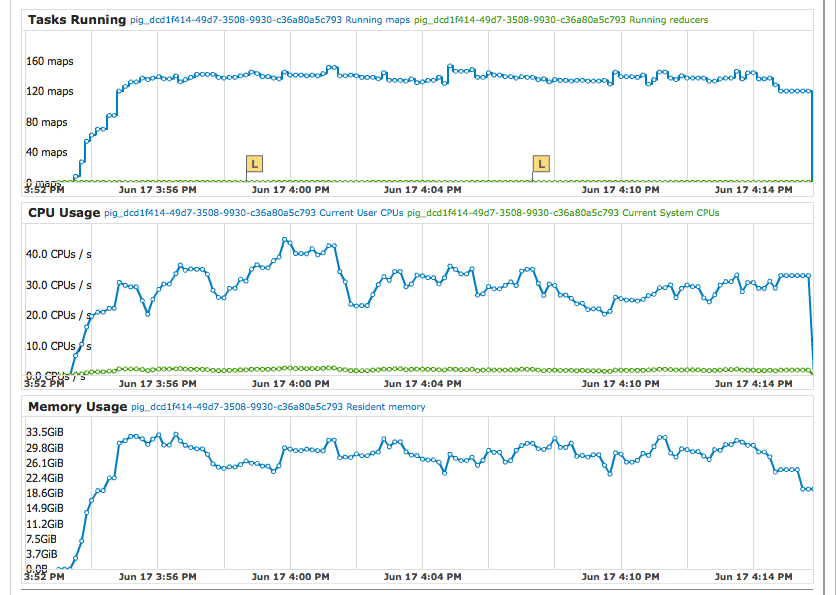Linux 6 Transparent Huge Pages and Hadoop Workloads
This past week I spent some time setting up and running various Hadoop workloads on my CDH cluster. After some Hadoop jobs had been running for several minutes, I noticed something quite alarming – the system CPU percentages where extremely high.
Platform Details
This cluster is comprised of 2s8c16t Xeon L5630 nodes with 96 GB of RAM running CentOS Linux 6.2 with java 1.6.0_30. The details of those are:
$ cat /etc/redhat-release
CentOS release 6.2 (Final)
$ uname -a
Linux chaos 2.6.32-220.7.1.el6.x86_64 #1 SMP Wed Mar 7 00:52:02 GMT 2012 x86_64 x86_64 x86_64 GNU/Linux
$ java -version
java version "1.6.0_30"
Java(TM) SE Runtime Environment (build 1.6.0_30-b12)
Java HotSpot(TM) 64-Bit Server VM (build 20.5-b03, mixed mode)
Observations
Shortly after I kicked off some Hadoop jobs, I noticed the system CPU percentages were extremely high. This certainly isn’t normal for this type of workload and is pointing to something being wrong or a bug somewhere. Because the issue was related to kernel code (hence high system times), I fired up perf top and tried to see where in the kernel code all this time was being spent (thanks @kevinclosson). Here is single iteration from perf-top which was representative of what I was seeing:
PerfTop: 16096 irqs/sec kernel:92.6% exact: 0.0% [1000Hz cycles], (all, 16 CPUs)
-------------------------------------------------------------------------------------------------------------------
samples pcnt function DSO
_______ _____ _____________________________________________________________________ __________________
223182.00 93.8% <a href="http://lxr.free-electrons.com/source/kernel/spinlock.c?v=2.6.32#L72">_spin_lock_irq</a> [kernel.kallsyms]
3879.00 1.6% <a href="http://lxr.free-electrons.com/source/kernel/spinlock.c?v=2.6.32#L64">_spin_lock_irqsave</a> [kernel.kallsyms]
3260.00 1.4% <a href="http://lxr.free-electrons.com/source/mm/compaction.c?v=2.6.35#L302">compaction_alloc</a> [kernel.kallsyms]
1992.00 0.8% <a href="http://lxr.free-electrons.com/source/mm/compaction.c?v=2.6.35#L378">compact_zone</a> [kernel.kallsyms]
1714.00 0.7% SpinPause libjvm.so
716.00 0.3% get_pageblock_flags_group [kernel.kallsyms]
596.00 0.3% ParallelTaskTerminator::offer_termination(TerminatorTerminator*) libjvm.so
169.00 0.1% _cond_resched [kernel.kallsyms]
114.00 0.0% _spin_lock [kernel.kallsyms]
101.00 0.0% hrtimer_interrupt [kernel.kallsyms]
At this point I decided to take a 60 second capture using perf record using the following command:
$ sudo perf record -a -g -F 1000 sleep 60
After I had the capture, I built a flame graph using Brendan Gregg’s tools (because I am a big fan of performance data visualizations).
Looking at the functions listed in the Flame Graph (below) it looked like the issue was related to virtual memory and the Linux source shows many of these functions are in linux/mm/compaction.c.

The issue seemed to be around virtual memory, however, this Hadoop job was using just 8 mappers per node and the java heap was set to 1GB, so there was plenty of “leftover” memory on the system, so why would this system be thrashing in the vm kernel code?
Experiment
While eating dinner and having a few beers something came to mind – Linux 6 had a new feature called Transparent Huge Pages, or THP for short. And like all new features that are deemed to add benefit, it is enabled by default. THP can be disabled by running the following command:
echo never > /sys/kernel/mm/redhat_transparent_hugepage/enabled
And this change, and only this change, is exactly what I did when I returned from dinner. I then fired off my Hadoop job and watched anxiously. To my pleasant surprise, the elevated sys CPU times were now gone and things looked much more like I wanted them to.
I’ve flipped back and forth several times and have had nothing but high sys times with THP enabled, so it’s pretty reproducible on my system.
Thoughts
I’m not 100% sure why THP are choking up my system (maybe bug vs. feature) but I’m certainly interested if others have seen similar behavior on Linux 6 with data intensive workloads like Hadoop and THP enabled. Other thoughts, experiment results, etc. are also very welcome.
To put things into perspective on how bad it gets, here are two screen captures of Cloudera Manager which highlights the ugly sys CPU times (see the middle chart; green = sys, blue = usr) when THP are enabled.
Do note the time scales are not identical.
Transparent Huge Pages enabled:

Transparent Huge Pages disabled:

Update:
The issue seems to be related to transparent hugepage compaction and is actually documented on the Cloudera Website (but my google foo did not turn it up) here which recommends the following:
echo never > /sys/kernel/mm/redhat_transparent_hugepage/defrag
I did stumble across the bug listed on the Red Hat Bugzilla site in the google cache but it is not publicly available for some reason (bummer). https://bugzilla.redhat.com/show_bug.cgi?id=805593 
Just confirming after I disabled THP defrag on my cluster the high sys CPU times are not present.
Update 2:
Just for documentation’s sake, here are some performance captures between THP enabled and disabled.
# echo never > /sys/kernel/mm/redhat_transparent_hugepage/enabled
# collectl -scm -oT -i2
waiting for 2 second sample...
# <----CPU[HYPER]----->
#Time cpu sys inter ctxsw Free Buff Cach Inac Slab Map
10:33:08 84 4 46083 6964 5G 324M 61G 60G 563M 25G
10:33:10 71 7 39933 25281 5G 324M 61G 60G 566M 24G
10:33:12 89 4 48545 15724 5G 324M 61G 60G 566M 25G
10:33:14 81 7 44566 8224 7G 324M 61G 60G 566M 23G
10:33:16 81 4 44604 8815 8G 324M 62G 60G 566M 22G
10:33:18 87 7 46906 20430 8G 324M 62G 60G 566M 22G
10:33:20 79 6 43565 11260 6G 324M 62G 61G 565M 24G
10:33:22 75 6 41113 13180 3G 325M 62G 61G 565M 26G
10:33:24 64 5 36610 9745 2G 325M 62G 61G 565M 27G
10:33:26 60 4 34439 7500 1G 325M 62G 61G 565M 28G
10:33:28 74 5 40507 9870 1G 324M 61G 60G 564M 30G
10:33:30 73 6 42778 7023 6G 324M 60G 59G 561M 25G
10:33:32 86 5 46904 11836 5G 324M 61G 59G 561M 26G
10:33:34 78 3 43803 9378 5G 324M 61G 59G 559M 25G
10:33:36 83 4 44566 11408 6G 324M 61G 60G 560M 24G
10:33:38 62 4 35228 7060 7G 324M 61G 60G 559M 23G
10:33:40 75 7 42878 16457 10G 324M 61G 60G 559M 21G
10:33:42 88 7 47898 13636 7G 324M 61G 60G 560M 23G
10:33:44 83 6 45221 17253 5G 324M 61G 60G 560M 25G
10:33:46 66 4 36586 6875 3G 324M 61G 60G 560M 26G
10:33:48 66 4 37690 9938 2G 324M 61G 60G 559M 28G
10:33:50 66 3 37199 6981 1G 324M 61G 60G 559M 28G
# echo always > /sys/kernel/mm/redhat_transparent_hugepage/enabled
# collectl -scm -oT -i2
waiting for 2 second sample...
# <----CPU[HYPER]----->
#Time cpu sys inter ctxsw Free Buff Cach Inac Slab Map
10:51:31 99 81 51547 14961 24G 326M 53G 51G 536M 15G
10:51:33 92 81 49928 11377 24G 326M 52G 51G 536M 15G
10:51:35 59 58 39357 2440 24G 326M 52G 51G 536M 15G
10:51:37 54 53 36825 1639 24G 326M 52G 51G 536M 15G
10:51:39 88 87 49293 2284 24G 326M 52G 51G 536M 15G
10:51:41 95 94 50295 1638 24G 326M 52G 51G 536M 15G
10:51:43 99 98 51780 1838 24G 326M 52G 51G 536M 15G
10:51:45 97 95 50492 2412 24G 326M 52G 51G 536M 15G
10:51:47 100 96 50902 2732 24G 326M 52G 51G 536M 15G
10:51:49 100 89 51097 4748 24G 326M 52G 51G 536M 15G
10:51:51 100 71 51198 36708 24G 326M 52G 51G 536M 15G
10:51:53 99 56 51807 50767 24G 326M 52G 51G 536M 15G
10:51:55 100 51 51363 66095 24G 326M 52G 51G 536M 15G
10:51:57 100 48 51691 73226 24G 326M 52G 51G 536M 15G
10:51:59 99 36 52350 87560 24G 326M 52G 51G 536M 15G
10:52:01 99 51 51809 42327 24G 325M 52G 51G 536M 15G
10:52:03 100 50 51582 62493 24G 325M 52G 51G 536M 15G
10:52:05 99 44 52135 69813 24G 326M 52G 50G 536M 15G
10:52:07 99 39 51505 65393 24G 326M 52G 50G 536M 16G
10:52:09 98 39 52778 54844 24G 326M 52G 50G 536M 16G
10:52:11 98 62 51456 30880 24G 326M 52G 50G 536M 16G
10:52:13 100 83 51014 21095 24G 326M 52G 50G 536M 16G
Update: 2013-09-17 Oracle comments on disabling THP in Oracle Linux: Performance Issues with Transparent Huge Pages (THP)